Chernobyl - Review TV - Rating 08/10 - Alert Spoiler
There is a famous phrase by Winston Churchill about the Soviet Union that reads:
"It's a riddle, wrapped in a mystery, in a puzzle."
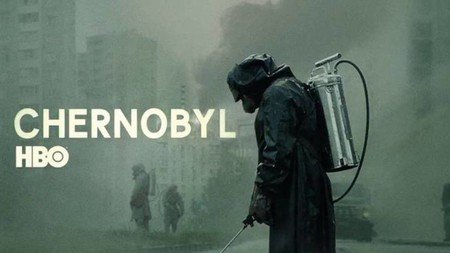
Image Source
Introduction
Chernobyl, the episodes, poses an interpretation of this phrase. The accident is a known event in the world. The causes and subsequent tasks, not so much. The starting point of the story is the explosion itself, and how it affects the inhabitants of the city of Pripyat, a few kilometers from the plant. What follows is a much larger universe.
This analysis cannot merely tell you the plot and the characters. It must go further; that beyond in Argentina, from where these words are written, is a thorny issue. We are a society that lightly falls into easy rankings. If Chernobyl is praised, someone can claim a pro-imperialist look. And with this term we already have a problem because the old USSR was, in essence, an expansive empire. But hey, one battle at a time. It said then, Chernobyl is an American product, financed by HBO and Sky (which is English). His gaze is that of Western individuals who take for granted certain characteristics of life in society, such as democracy and press freedom, to say only two, who have not historically been hegemonic in other parts of the world, paradoxically in the most extensive - the Russian Federation and former USSR - and the most populous, as is China.
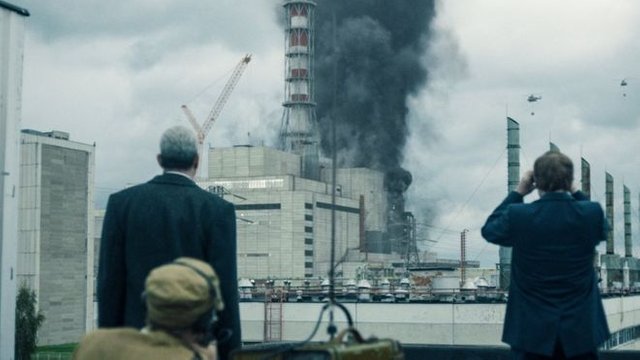
Image Source
Cast and Story
Aware of this look, Craig Mazin, the creator and screenwriter of the series, focuses the story on more universal issues, on people, some real and other fictional, and on common principles: lies cost lives. It is a full success.
At the beginning of chapter 1, the reactor control room 4 is baffled. Something exploded. The meters went wild, the floor shook and the glass exploded. The highest ranking man in that room is Anatoly Dyatlov (Paul Ritter). And from the first moment we know that this man is a real cretin. Toptunov (Robert Emms) and Akimov (Sam Troughton), two juniors, are convinced that what happened is very serious. Dyatlov, on the other hand, is in a state of denial: for him it is a minor accident. Everything you order to do to confirm it costs lives. And when they confirm it, he denies it again, turning the whole situation into a story of the good pipe.
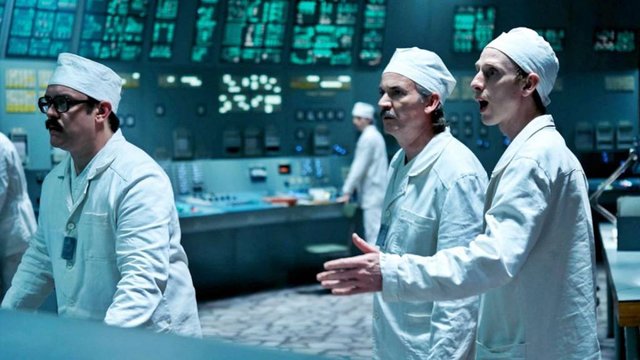
image source
In parallel, the fire department goes to the plant, to deal with what in principle would be the fire in the ceiling tiles of one of the buildings that make it up. The Chernobyl atomic complex was huge, and consisted of four functional reactors and dozens of buildings. Firefighter Vasily Ignatenko (Adam Nagaitis) and his companions encounter a reality that they do not understand, in a situation for which they were not prepared. They approach the fire and see that the whole building is demolished. They don't know, but they are meters away from a nuclear reactor that exploded. They take fragments of the floor, what turns out to be graphite, material that is inside the reactor, and in contact with nuclear fuel. Automatically, firefighters who take these items suffer burns from radioactivity. They break down while they work. In the morning they are transferred to the hospital and from there to Moscow. Vasily's wife, Lyudmilla (Jessie Buckley), follows her course, from Pripyat hospital to Hospital 6, in Moscow, where radiation-affected patients are finally treated. They are all dying slowly, and for the worse, it is contagious.
We will see that the engine of the first chapter is precisely this state of denial, which is going up the chain of command, through Fomin (Adrian Rawlins) and Bryukhanov (With O'Neill), responsible for the Chernobyl plant, to Boris Shcherbina (huge in every way Stellan Skarsgård), vice president of the Council of Ministers, in charge of Energy, Gas and Oil. Everyone dismisses the importance of the accident. But Shcherbina quotes Valery Legasov (Jared Harris), who is a chemist, with a hierarchical position at the Kurchátov Institute of atomic energy. The aforementioned meeting turns out to be the Cabinet of Ministers, and it is chaired by Michail Gorbatchev (David Dencik). Legasov, after reading only a couple of pages of the report, realizes that something very serious happened in Chernobyl. And that is not declared. Beyond the attempts to minimize the situation, Legasov is heard by Gorbatchev and sent with Shcherbina to see in situ what the hell happened in Chernobyl.
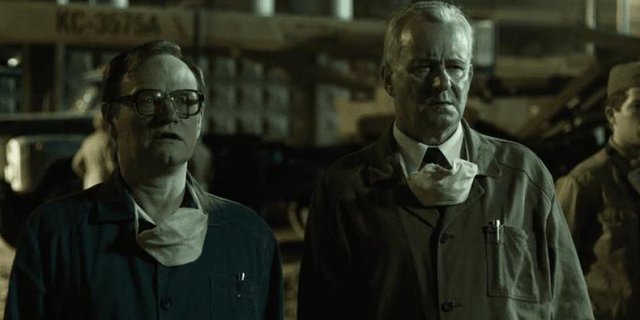
Image Source
What follows is a process that has several edges. First the catastrophe movie. Shcherbina and Legasov face something dreadful that may continue to get worse. They must make drastic decisions immediately. Decisions will cost lives. And their own are not only at stake, but they have already been shortened by just being there.
The other edge is the investigation, typical of a police officer. What happened on the night of April 26, 1986 in the control room of reactor 4? As a mantra, characters who have knowledge of nuclear energy repeat: RMBK reactors do not explode. It is impossible. That is why the lethal delay is adduced in admitting that it had happened. And here a fictional character is introduced (so far, all were real), Dr. Ulana Khomyuk (Emily Watson), nuclear physicist at the Atomic Institute of Kiev. This character works as a representation of the scientific community that advised Legasov. The best of the Soviet Union, at the service of controlling the disaster and discover what had happened.
Khomyuk detects radioactive particles in the atmosphere on its own and, when analyzed, deduces that they must be from the Chernobyl plant, about 400 km from where it is located. Through his higher knowledge of the operation and construction of the reactor, he avoids a latent explosion, which, it is explained, would annihilate millions of inhabitants.
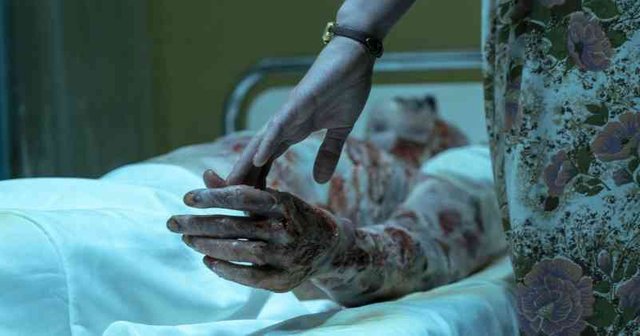
Image Source
What follows is the story of the sacrifice of thousands, to safeguard millions. The story shows that the disaster was systemic. It was caused by the structural corruption of a declining political system, as was the case in the Soviet Union in 1986. But that same system, and above all, that same people, was perhaps the only one on Earth capable of making the conscious sacrifice to mitigate it. The Soviet Union mobilized all its resources (all the liquid nitrogen in the country), to the Red Army, miners, specialists. All this huge human group, estimated at 600,000 people, became the so-called "liquidators." They avoided a greater evil and controlled a situation that was, at first, desperate.
Chernobyl gives an account of these short stories, such as the so-called “divers” and the “miners”, as well as that of Lyudmilla and Ulana, that of the lunar vehicles and that of the pet exterminators, without ever losing sight of the other great story , which is the fight side by side of the bureaucrat and the scientist for the survival of one (or several) countries.
Shcherbina is a character to remember. An important man, but not so much as to double the power structures at his will. Far from driving, he is within the circle of responsibilities, as Comrade Charkov (Alan Williams), head of the KGB says in a masterful scene. Everyone watches everyone, and obsessed with not being humiliated by the West, they live taking care of appearances and above all, avoiding political strides so as not to lose the position they hold. The transformation of Shcherbina is one of the axes of the story. From one-dimensional villain to central figure in operating the power levers. From Legasov's antagonist to unconditional ally, it is his transformation that we see on the screen. Valery Legasov, on the other hand, is a catalyst, from the first scenes, his condition is different. It is not counterrevolutionary, but it is not an unconditional convinced. He seems to suspect, from minute one, that the accident was a catastrophe not only nuclear, but systemic.
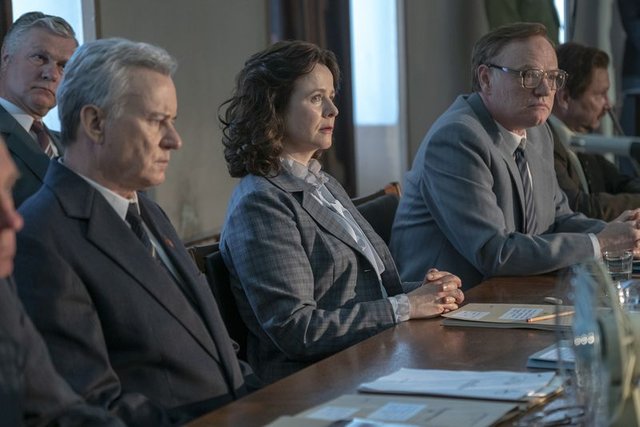
Image Source
Personal Thoughts
This is not the typical American description of the Soviets on the screen. Shcherbina, Legasov and Khomyuk are joined by generals Pikalov (Mark Lewis Jones) and Tarakanov (Ralph Ineson), who bravely face the impossible. All the short story of the pet exterminators is a kind of micro look representing the macro. Faced with a monstrous reality, soldiers do not lose their humanity. They do what they should do, since it is the very concept that sustains the entire nation.
He said before, those who think that this is anti-communist propaganda lost the axis of the story. It is a story about structural corruption. The fifth and final chapter realizes this. The disaster was triggered by multiple avoidable failures. All failures have to do with lies, omissions and generation of appearances that ended with the loss of thousands of lives. In a time of false news, manipulation by the media and leaders with totalitarian tendencies, it works as an admonitory story: the truth does not matter to all the lies that are created to cover it. Finally, it comes to the surface. Magic thinking, messianism and fear will not save us when it emerges.
Rating
We are not Judges, to judge a delicate and quite strong project, but it should be noted that from a clearer point of view, it has left a lot of power in desires, so I leave you a range of 08/10. But it leaves us a deep truth, of what could have been, the important thing is not to hide that background that many always hide.
Congratulations @loren06! You have completed the following achievement on the Steem blockchain and have been rewarded with new badge(s) :
You can view your badges on your Steem Board and compare to others on the Steem Ranking
If you no longer want to receive notifications, reply to this comment with the word
STOPDo not miss the last post from @steemitboard:
Vote for @Steemitboard as a witness to get one more award and increased upvotes!
Really interesting topic about this movie. 8 Stars it's really great!
Thanks for your contribution.
Regards,
@anggreklestari
[Realityhubs Curator]